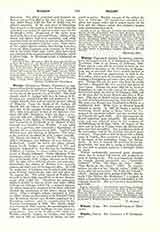

Werner, FRIEDRICH LUDWIG ZACHARIAS, convert, poet, and pulpit orator, b. at Konigsberg, Prussia, November 18, 1768; d. at Vienna, February 17, 1823. When sixteen years old he attended lectures on law and political economy at the University of Konigsberg, and at the same time was a zealous disciple of Kant. He received an appointment as clerk in the War Office, which post he retained for twelve years, residing at Konigsberg and other cities, lastly at Warsaw. During this era the poet, who from his youth had led a dissipated life, was married and divorced three times. During the years 1801-04 he lived at Konigsberg in order to take care of his mother, who had lost her mind; she died on February 24, 1804, and on the same day his friend Mnioch also died at Warsaw. This day of double sorrow provided him with the title of his best known tragedy, “Der 24. Februar”. The next year Werner was transferred to Berlin as a confidential clerk. While there he devoted himself entirely to poetry. In 1807 he began a period of wandering, finally going to Rome, where he “renounced his erroneous beliefs” and was received into the Church (April 19, 1810). After this event his life flowed somewhat more smoothly. He studied theology and was ordained priest in the seminary of Aschaffenburg on June 14, 1814. In August of the same year he went to Vienna, where the historic congress was then assembled. The peculiarities both of his personality and of his sermons attracted great attention. From 1816 to 1817 he lived with a Polish count in Podolia, then returned to Vienna and lived in the house of the archbishop, Count von Hohenwarth. In 1821 he entered the novitiate of the Redemptorists, but soon left it, owing to failing health. He was able to preach, however, a fortnight before his death.
Werner undoubtedly possessed great dramatic talent, but he lacked self-control, and produced no work of lasting merit. The most important, besides the tragedy already mentioned, are: “Vermischte Gedichte” (1789), “Die Sohne des Tales” (1803), “Das Kreuz an der Ostsee” (1806). To counter-balance the effect of his “Martin Luther” (1807), he wrote, after his conversion, “Die Weihe der Unkraft” (1814). During this latter period of his life, also, he wrote “Die Mutter der Makkabaer”, a tragedy in which a beautiful tribute is paid to his mother in the principal character. His sermons were not published until 1840.
N. SCHEID

